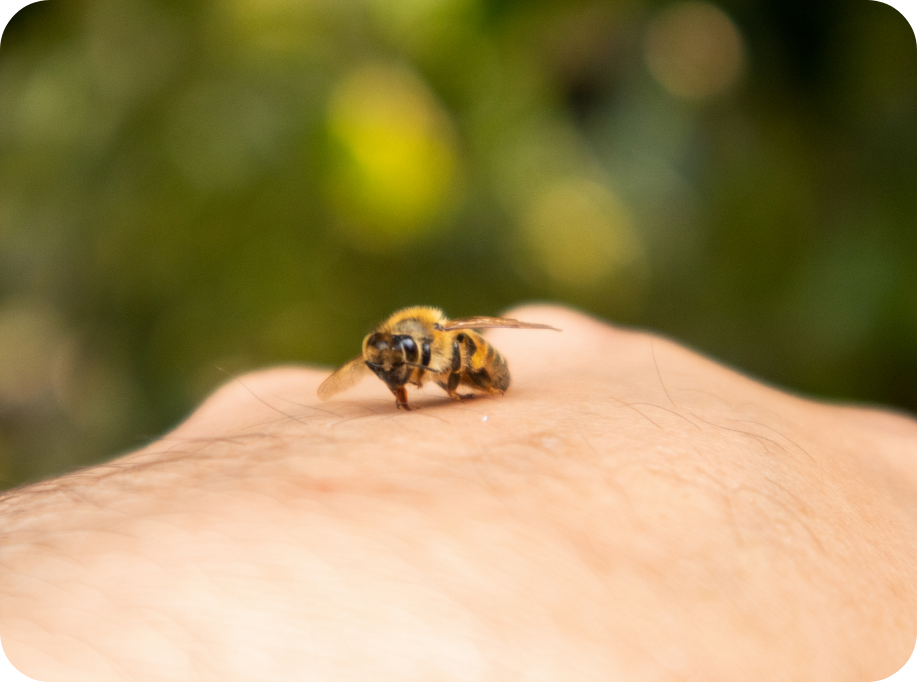
Treatment for Bee Sting Allergies
Bee sting allergies can potentially be life-threatening. It is important to have an accurate diagnosis and a clear treatment plan in place.

What is a Bee Sting Allergy?
A bee sting allergy, or hymenoptera sensitivity, is a potentially severe allergic reaction that occurs when an individual’s immune system overreacts to the venom injected by a bee or similar stinging insect. Individuals with an allergy to venom protein can potentially have a severe systemic reaction called anaphylaxis. Understanding the intricacies of bee sting allergies is vital as it enables individuals to recognize the symptoms, seek timely medical attention, and take precautionary measures to reduce the risk of future stings and allergic reactions.
What Are the Symptoms of Bee Sting Allergy?
Stings from bees and other insects can cause a variety of reactions, including the following:
Localized Swelling
The immediate and localized enlargement of the skin at the sting site, often accompanied by pain and redness
Pain
Stings can be painful, causing discomfort at the site of the sting
Redness
The affected area may become noticeably red, signaling inflammation and irritation
Hives
Raised, itchy welts that can appear anywhere on the body separate from the sting site which can be indicative of an allergy to bee venom
Diffuse Swelling
Allergic reactions can lead to swelling in other parts of the body, not just where the sting occurred
Shortness of Breath
Difficulty in breathing may develop as the airways constrict due to the allergic response
Loss of Consciousness
In severe cases, a person may faint or lose consciousness due to a drop in blood pressure caused by anaphylaxis
Anaphylaxis
A life-threatening allergic reaction that is defined as involving two or more systems (such as skin and respiratory), symptoms can include hives, swelling, shortness of breath, nausea, vomiting, diarrhea, and a rapid drop in blood pressure
Diagnosing & Treating Bee Sting Allergies
Medical History
Your allergist at Impact Medical will begin by gathering a comprehensive medical history, which includes information about the most recent reaction and any prior insect bites.

Diagnostic Testing
There are two different ways to test for a bee sting or hymenoptera allergy – allergy skin testing and laboratory testing called ImmunoCAP.

Treatment
Based on your history and results from diagnostic testing, your allergist will provide you with an emergency and preventative treatment plan.
Bee Allergy Testing in New Jersey
Is There a Test for Bee Sting Allergy?
Treatments for Bee Sting Allergies in New Jersey
How to Treat Bee Sting Allergy?
Bee Sting Allergies FAQs
This is considered a local reaction and traditionally not considered indicative of an allergy. However, a small percentage of individuals with large local reactions are truly allergic to bee stings. You and your doctor at Impact Medical will decide if an allergy evaluation is indicated.
Yes, having an allergic reaction to your first bee sting is possible. Subsequent stings are usually more severe.
Rescue or emergency medications such as Benadryl and an EpiPen should always be available but special attention should be given in high-risk environments such as hiking, picnics, or barbecues during the spring, summer and fall months.
No, food allergies are not related to bee sting allergies.
No, pollen allergies are not related to bee sting allergies.
Venom immunotherapy (allergy shots to bees) is considered 96% effective in preventing future systemic reactions to bee stings.
There is not a definite duration. We typically say a minimum of three years and then retest. Some individuals receive venom immunotherapy for many years.
Yes. The risk of a severe reaction is significantly lower when on bee sting allergy shots but it is still recommended to carry emergency medications.
It is estimated that about 5% of the population are allergic to bee stings and are at risk for anaphylaxis.
The most common reaction is localized swelling, redness and itchiness. However, there is a very small risk of anaphylaxis to allergy shots and therefore at Impact Medical we require that patients wait for 30 minutes after receiving their injections and have diphenhydramine (Benadryl) and an epinephrine auto-injector (i.e. EpiPen or Auvi-Q) accessible for a few hours after receiving their allergy shot(s).



